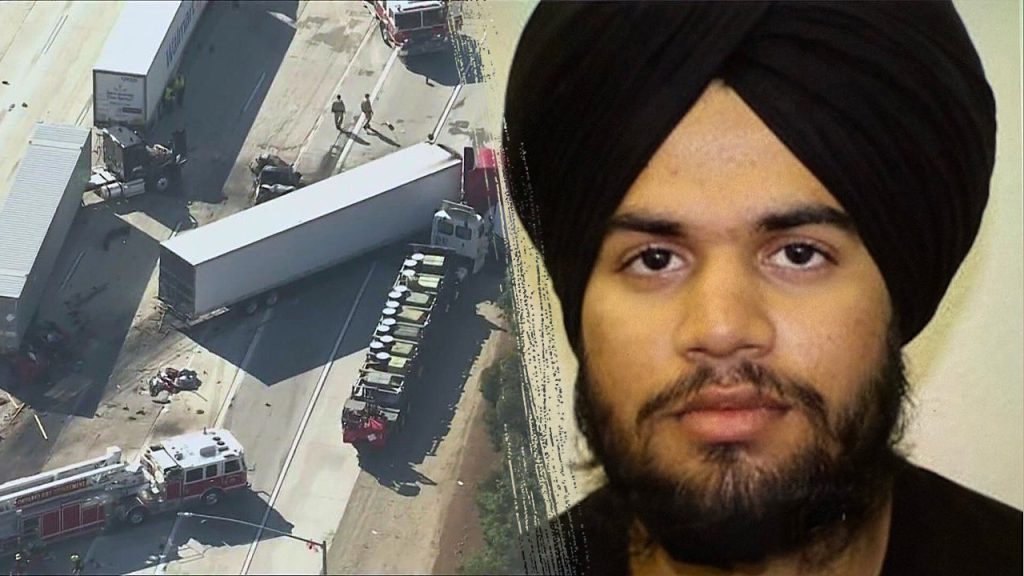The Tragic Consequences of California’s CDL Issuance to Undocumented Immigrants
Recent revelations from the White House have shed light on a troubling incident involving an undocumented immigrant truck driver who obtained a commercial driver’s license (CDL) in California before being involved in a fatal crash. White House press secretary Karoline Leavitt confirmed that California granted a CDL to Jashanpreet Singh, a 21-year-old immigrant from India who has been charged with gross vehicular manslaughter after allegedly causing a crash on Interstate 10 in San Bernardino County that claimed three lives. According to law enforcement sources, Singh first entered the United States illegally in 2022 through the El Centro Sector in California and was subsequently released pending an immigration hearing. The tragedy has intensified scrutiny on state policies regarding license issuance to undocumented immigrants, with Leavitt noting that the Department of Transportation under Secretary Duffy has been actively investigating what she described as a “disturbing pattern” of CDLs being granted to individuals without legal status.
The incident has created ripples of grief throughout the community, particularly at Pomona High School, which identified two of the victims as assistant basketball coach Clarence Nelson and his wife. Police investigations revealed that Singh allegedly never attempted to brake before crashing into slow-moving traffic, with toxicology tests confirming impairment at the time of the accident. This devastating event doesn’t stand alone but follows a similar tragedy from earlier this year when another undocumented immigrant truck driver, Harjinder Singh, allegedly caused a fatal accident in Florida after making an illegal U-turn on the Florida Turnpike. That August 12 crash resulted in three deaths, after which Harjinder Singh fled to California before being apprehended and extradited back to Florida to face charges. These back-to-back incidents involving CDL holders without legal immigration status have raised serious questions about the screening processes and safety standards being applied in commercial licensing procedures.
The transportation safety concerns highlighted by these incidents prompted decisive action from the federal government. On October 15, Transportation Secretary Sean Duffy announced that the Federal Motor Carrier Safety Administration would withhold more than $40 million in funding from California after an investigation determined that the state had failed to comply with English Language Proficiency standards for commercial drivers. This financial penalty represents a significant effort to enforce compliance with federal safety regulations designed to ensure that all commercial drivers can understand and respond to critical road signage and communications. Secretary Duffy emphasized the seriousness of the situation in his public response to footage of the incident, stating, “This is exactly why USDOT has withheld $40 MILLION from California for failure to comply with our rules to protect drivers. We cannot allow our roads to be a dangerous place!”
The political dimensions of these incidents have become increasingly evident as details emerge about the immigration backgrounds of the drivers involved. In the case of Harjinder Singh, Department of Homeland Security assistant secretary Tricia McLaughlin revealed that he had crossed into the United States illegally in 2018 through the southern border before obtaining a CDL in California. His application for work authorization had been rejected by the previous administration in September 2020, yet he was nonetheless able to acquire a commercial license and operate a large commercial vehicle on American roadways. Similarly, Jashanpreet Singh entered the country during a period of changing immigration policies, creating questions about the intersection of federal immigration enforcement and state licensing authorities. The White House’s confirmation that California issued these licenses has highlighted tensions between federal and state approaches to undocumented immigrants and public safety.
The human cost of these policy disconnections is immeasurable. Each of these incidents represents not just statistics in a policy debate but real lives irrevocably altered or ended. Families like those of Coach Nelson and his wife are left to grapple with sudden, preventable losses while communities mourn valued members. The victims in these crashes had no say in the policies that may have contributed to their fates, yet they bear the ultimate consequence of systems that failed to adequately protect public safety. Meanwhile, the national conversation around immigration and transportation safety has become increasingly fraught, with these tragedies serving as painful focal points for discussions about responsibility, enforcement, and the balance between compassionate immigration policies and public safety imperatives. The aftermath of these crashes demonstrates how abstract policy decisions can translate into concrete, life-altering outcomes for ordinary Americans going about their daily lives.
As federal and state authorities grapple with these issues, the path forward remains uncertain but urgent. The Department of Transportation’s financial sanctions against California represent one approach to enforcing compliance with federal standards, but questions remain about how to address the broader issues at the intersection of immigration policy and public safety. Governor Newsom’s office has yet to provide an official response to these incidents or the federal withholding of transportation funds, leaving Californians uncertain about potential changes to state licensing procedures. What remains clear, however, is that the current system contains dangerous gaps that have resulted in preventable tragedies. Finding solutions will require thoughtful collaboration between federal immigration authorities, state licensing agencies, and transportation safety officials to ensure that commercial driving privileges are granted only to those who can safely exercise them, regardless of immigration status. The lives lost in San Bernardino County and on the Florida Turnpike demand nothing less than a comprehensive reevaluation of the systems that failed to protect them.













